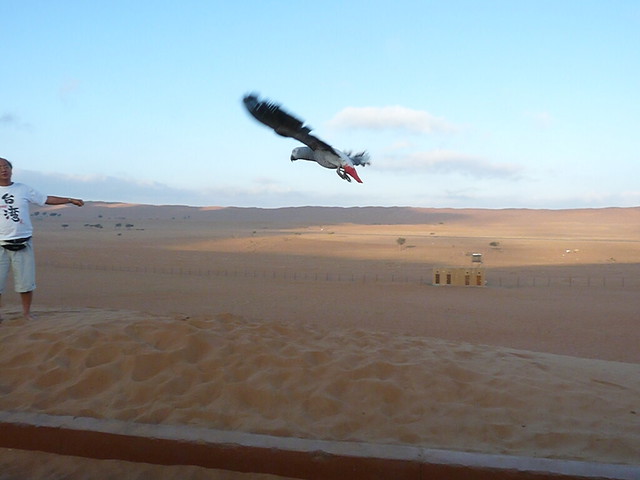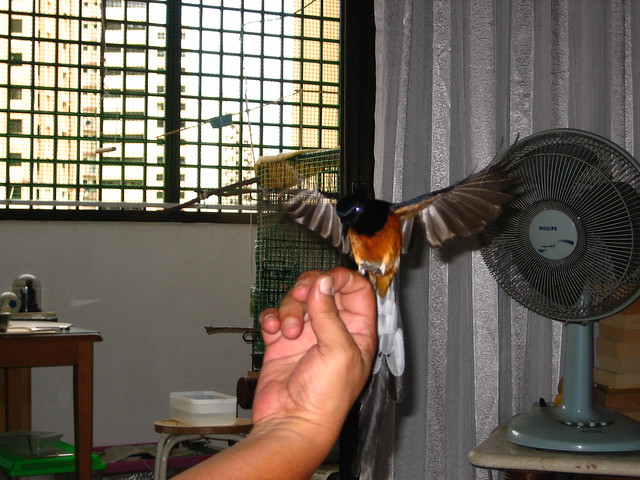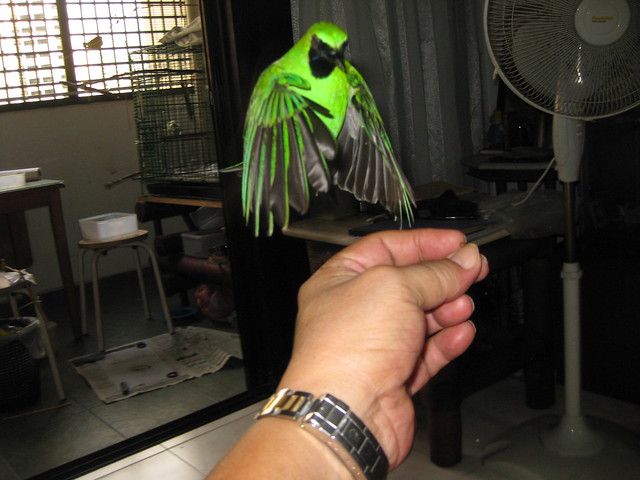Diana,
I am sorry to hear of your back problems. I have very good friends with that and I know how much of an issue that can be. I wish you full recovery.
You should also know I am very envious that you have a grand daughter. I am at wits end and hoping my son will give me one. Son or daughter, I just love to have one.
Those two that you just read will be the key articles. First to the overall health via food, and the other to their mental and emotional well being. And I have to add, our own emotional well being too.
I have to say recalls are not difficult at all. But the groundwork must be done.
You must be attractive to the birdie that the birdie will like to come to you in the first place. That the birdie has the trust in you and birdie decided that going to you is pleasurable.
Riamfada was a wild caught CAG as seen in her open leg ring. She was a rescue and given to my charge when she was about 5-6 years old. She came to me bitey and fearful.
In about a year, she was doing free flights to me in the open.


Yingshiong above is a white rumped shama. A shama is a songbird. He was caught from the wild at about 3 years old. He was given into my charge at about 5 years old. He flew to me on cue within a month of coming to me. Breeders of shamas told me even their breed shamas , some they hand raised, never ever landed on them. They told me above was the first ever they seen of a male shama landing on a human.

Libai is a Greater Greenleaf song bird. Caught from the wild and probably about 3 years old or so when he came to me.
Even wild caught and old birds can be so easily trained and bonded if you know how.
Understanding them is the first and most important step that can be taken.
That is the most fundamental truth in looking after birds.
The white rumped shama and the Greater Greenleaf bird are classified as aviary birds. I am not even sure what that meant. I think humans are too prone to classifying things and thereby ending the understanding of things.
All birds, even within the same species , will be different. So I cannot make general projections even to the same specy from what I have done from one.
But it can be seen from my careful recordings that I took great care in slowly presenting myself to the different birds. In a room that is safely sealed and that they can fly in. With space that they can fly away from me, and that they only fly to me should they so wish.
When they have the space to avoid you if they so wish, the birdie will be a lot less fearful of you.
I would take a book into their room, and just read, not even making or trying to make eye contact for the first few days.
Only when I sensed they approach me do I even make eye contact.
In the position of equality, they were fed well. I made a point to interact with them after I gave them breakfast. It will be a mockery to say one is equal , and then use food, or denial of food, to pressure them to come to you. All their training were done after breakfast given to them. In some cases, they even break from training with me to fly back to their cage to continue their breakfast and then fly back to me. And yet their recalls to me, and respond to other cues were almost all done with split second military precision.
It was only when they were used to me and my presence, and come willingly to me, that I started training the recall process.
All my birdies had to demonstrate they will respond to recall cues before they graduate out of the flight room and allowed access to the rest of the house/apartment.
You will agree it can be a nightmare if birdie fly all over the house and not come to you on recall. Simple common sense can make living with flighted birds at home a lot easier.
And yes, birdies were also taught to fly back into their flight room and cage when cued.
Please do not use a time table, or even think of a time table.
Any training must be at the pace of the bird. If you have a time table, you might end up nervous. Birdies being empaths, will sense that in you, and be nervous as well.
Enjoy them, enjoy their presence.
Birdies can sense too your enjoyment of them and their presence. That will be a positive feedback process and they too will enjoy you and your presence. The recall process will come faster only if you do not rush it.

